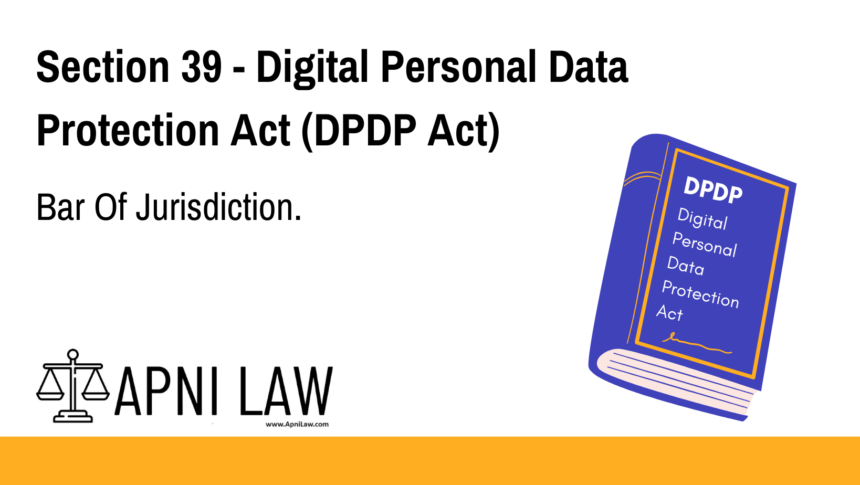Code: Section 39 DPDP Act
No civil court shall have the jurisdiction to entertain any suit or proceeding in
respect of any matter for which the Board is empowered under the provisions of this Act
and no injunction shall be granted by any court or other authority in respect of any action
taken or to be taken in pursuance of any power under the provisions of this Act.
Explanation of Section 39 DPDP
Section 39 of the Digital Personal Data Protection Act (DPDP) limits the role of civil courts in cases related to data protection. It ensures that matters under the Board’s jurisdiction are handled exclusively by the Board. Additionally, it prevents courts or authorities from blocking actions taken under the DPDP Act.
Key Points:
- No Civil Court Jurisdiction: Civil courts cannot hear cases or proceedings related to matters under the Board’s jurisdiction as per the DPDP Act.
- No Injunctions: Courts or authorities cannot issue injunctions to stop any action taken under the DPDP Act. This provision prevents external interference with the Board’s work.
Illustration
Example 1: Data Protection Dispute
Imagine a case where a person believes that their personal data has been misused by a company. Instead of going to a civil court, the individual must bring the issue before the Data Protection Board. The court cannot intervene or halt the proceedings.
Example 2: Enforcement of Penalty
If the Data Protection Board imposes a fine on a company for violating data protection rules, no civil court can stop the penalty. The law ensures that only the Board has authority over these matters.
Common Questions & Answers on Section 39 DPDP
1. Can civil courts hear cases related to data protection under the DPDP Act?
- Answer: No, civil courts are excluded from hearing cases that fall under the DPDP Act. Only the Board has the authority to address these matters.
2. Can a court stop actions taken by the Board?
- Answer: No, courts cannot issue injunctions to prevent actions taken by the Board under the DPDP Act.
3. Why does Section 39 limit civil court involvement?
- Answer: This provision ensures that the Board, with its specialized knowledge, handles data protection issues more effectively and without delays.
4. Does this provision deny access to justice?
- Answer: No, the law directs all data protection matters to the Board, which is better equipped to resolve them quickly and efficiently.
Conclusion
Section 39 of the DPDP Act ensures that matters related to data protection are handled by the Data Protection Board. It restricts civil courts from hearing such cases and prevents them from blocking actions taken by the Board. This streamlines the process and ensures that data protection issues are resolved without unnecessary interference.
For more details about the DPDP Act, visit ApniLaw, your trusted source for legal insights.








